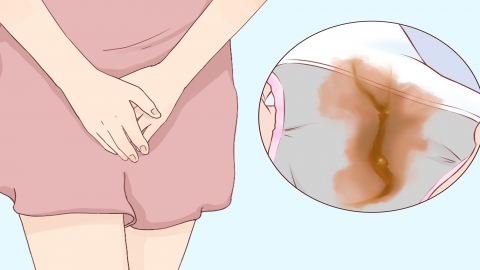What causes brownish discharge more than four months after childbirth?
More than four months postpartum, brownish vaginal discharge may occur due to early menstrual recovery, excessive fatigue, cervicitis, endometritis, vaginitis, or other causes. This condition can be improved through observation and recording, adequate rest, and medical treatment. If the discharge increases or is accompanied by abdominal pain or an unusual odor, prompt medical attention is necessary.
1. Early Menstrual Recovery: After childbirth, ovarian function gradually returns, and the first menstrual period may involve light bleeding. The blood may appear brown due to oxidation and could be accompanied by mild bloating. It is recommended to record the amount and duration of discharge, keep the abdomen warm, and avoid strenuous exercise.
2. Excessive Fatigue: Long-term care of the baby or doing housework after childbirth can lead to physical exhaustion, affecting uterine recovery and resulting in brownish discharge, possibly accompanied by lower back pain and general weakness. It is advised to reduce physical labor, ensure sufficient sleep, and have family members assist with childcare duties.

3. Cervicitis: After delivery, the cervical mucosa may not be fully healed, making it susceptible to bacterial infection and inflammation. Inflammatory stimulation can cause cervical congestion and bleeding, leading to brownish discharge and increased vaginal discharge. Under a doctor's guidance, medications such as Baofukang Suppositories, Cefixime Dispersible Tablets, or Gynecological Qianjin Tablets may be used to relieve symptoms.
4. Endometritis: Poor healing of the endometrium after childbirth allows bacteria to invade and cause inflammation, resulting in minor uterine bleeding that appears as brownish discharge, often accompanied by dull lower abdominal pain. Under medical supervision, medications such as Metronidazole Tablets, Levofloxacin Capsules, or Fuyankang Tablets may be prescribed to improve symptoms.
5. Vaginitis: Inadequate hygiene after childbirth can disrupt the vaginal flora balance, causing inflammation. Inflammatory irritation may lead to slight bleeding of the vaginal mucosa, resulting in brownish discharge and external genital itching. Follow medical advice to use Clotrimazole Suppositories, Metronidazole Suppositories, or Jieeryin Wash Solution to alleviate symptoms.
Maintain good external genital hygiene, change underwear frequently, choose cotton and breathable undergarments, avoid tub baths and sexual intercourse until symptoms resolve, and maintain a light, nutritious diet rich in protein to support recovery.




